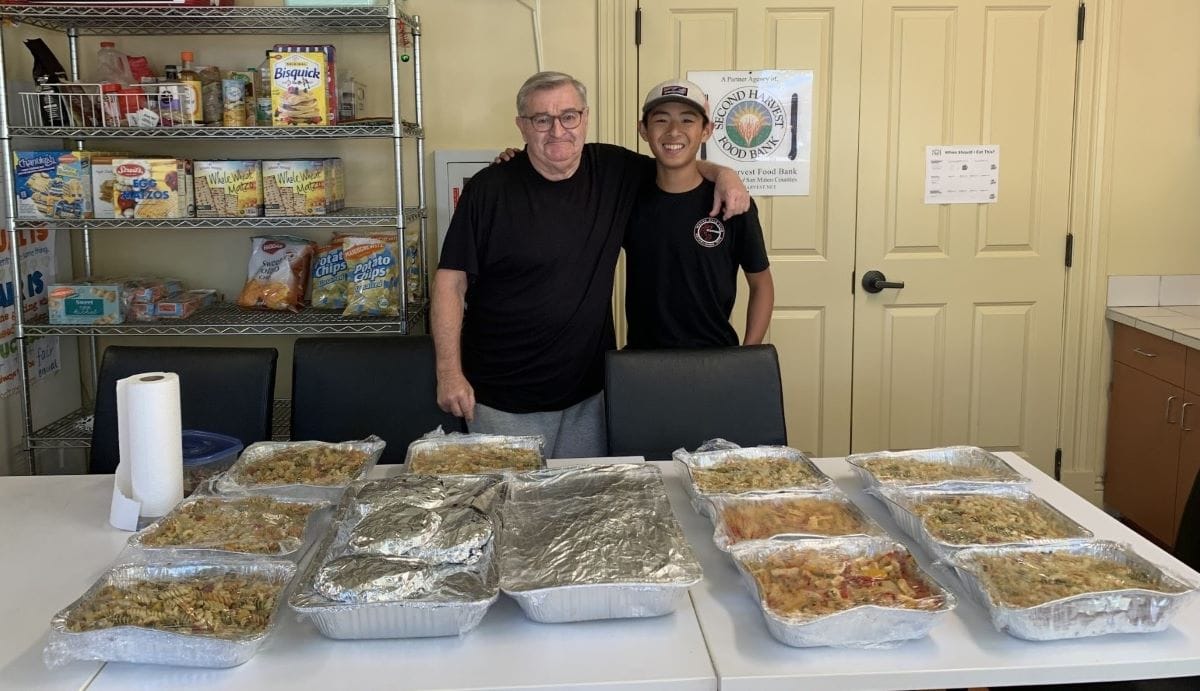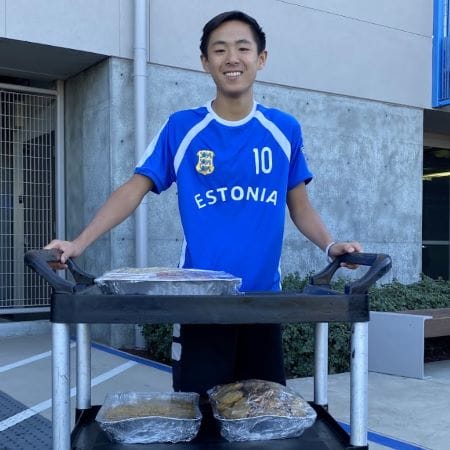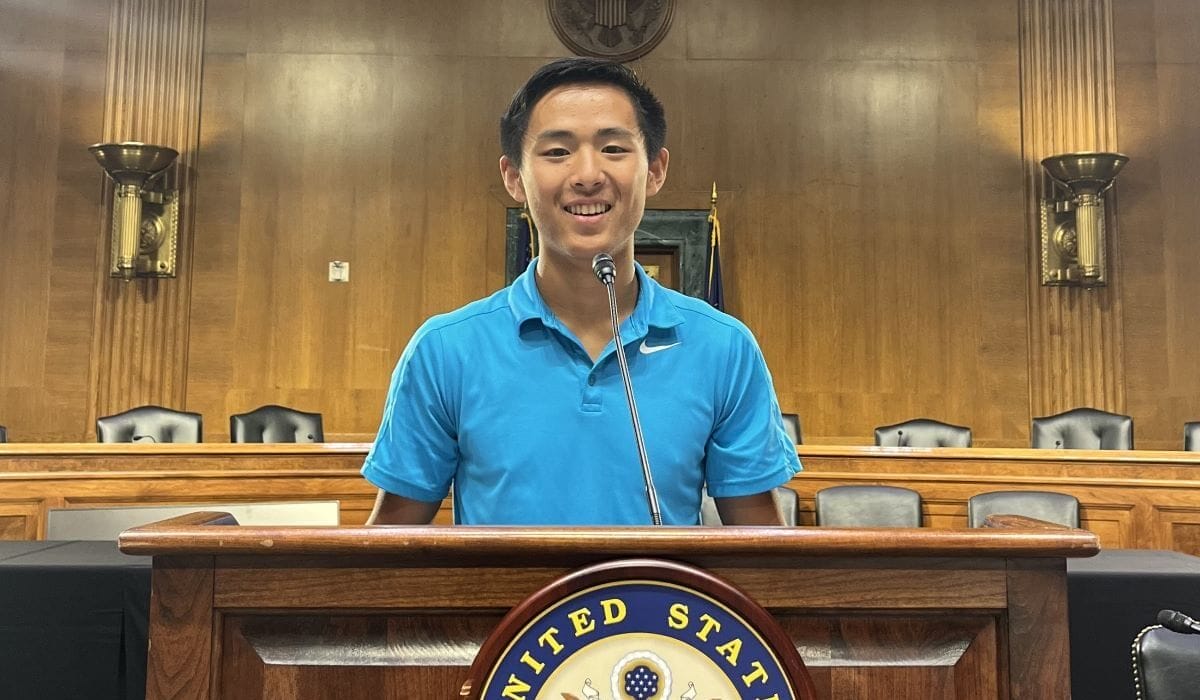California Teen Fights Food Insecurity by Reducing Food Waste in Schools

Meet Daily Point of Light Award honoree Colin Chu. Read his story, and nominate an outstanding volunteer or family as a Daily Point of Light.
Sixteen-year-old Colin Chu loves his community. He plays water polo with a local club and French horn with a youth orchestra, and he spends his free time with friends and family. He loves his community while recognizing that not everyone has a similar level of support.
The pandemic caused a lot of struggles, but upon returning to the classroom, Colin saw two problems that could solve each other. By eliminating food waste from his school, he could fill stomachs at the nearby shelters. With some initiative and follow through, his vision came to life as Homeless Heroes.
Colin and his volunteers have donated more than 135,000 meals and impacted the lives of 1,000+ unhoused people. Aside from the obvious benefits, Homeless Heroes has empowered hundreds of young people to engage in service, and putting uneaten food to use has removed the equivalent of 1,000 trees-worth of carbon dioxide from the atmosphere each year.
Read on to learn more about Colin’s story.
What inspires you to volunteer?
I’ve been passionate about making a positive impact in my community from a young age, and more recently, I’ve seen environmental and social justice issues that really affect it. I’m inspired by the people and diversity here and want to find ways to support those who have less fortunate circumstances than me.
Coming back to school after the pandemic, I noticed how many meals were being thrown out in my school’s cafeteria. Just a few miles away from my school, there were people who didn’t have food to put on the table. That’s what inspired me to found my nonprofit.
Tell us more about founding Homeless Heroes. Did you have any challenges that you had to overcome, or anything that surprised you?
In my research, I was shocked to learn that about one-third of the food produced globally is wasted. I attend school in San Mateo, but three of the top 10 cities with the highest rate of housing insecurity in the country are in the Bay Area: San Jose, Oakland and San Francisco.

I reached out to the staff at my school’s cafeteria to see if we could redistribute the unused, unexpired food. It was a pretty lengthy process. This is something that they have seen as an issue for a while but have never really found a solution for. We did things like creating a liability waiver so that the school wasn’t legally responsible for the food after it left for the shelters, and we continue to coordinate between schools and shelters while ensuring we understand their specific needs. Going into this project, I wanted to focus on areas where environmental justice issues impact marginalized people even more.
What does your day-to-day look like?
I still get to do a lot of deliveries. I also manage some of our other projects, like an interview series where students like myself interview unhoused clients. One of my favorite parts of this work is being able to meet the people who receive our food. They share their stories, including how they became unhoused, how they found shelter, what they wish people knew about being lacking permanent shelter and more. It’s been really moving for me. We’re really trying to bridge that gap between students and the older generations we serve and between those facing housing insecurity and those who aren’t.
What are your long-term plans or goals for the organization?
We have the potential to expand across the state and further. We’ve reached out to and are currently working with about 10 to 12 other schools in the Bay Area to create more chapters. I’m also excited to see how we can expand beyond delivering food and build other systems to address sustainability and malnutrition.
What have you learned through your experiences as a volunteer?
The outreach component, being able to work with community stakeholders and find ways to communicate with them. Getting a good grasp on scheduling and following up was really helpful, because I needed to reach out to other schools and shelters.
Also, there are a lot of misconceptions about people who are unhoused and the challenges they face. Many of them have talked about how it’s a struggle to even find a place to sleep or somewhere that’s warm and quiet. During one of our deliveries, someone came up to me and shared how they hadn’t received dairy for an entire month. They were happy for the delivery of our extra milk cartons. These small conversations with them have shed a lot of light on how meaningful their stories are and how using those stories can generate change by building empathy.

Why is it important for others to get involved with causes they care about?
Sometimes we don’t see the full picture. We don’t see what other people are experiencing. We don’t even see other parts of our own city or neighborhood. By volunteering and getting engaged, we gain new perspectives. We also get to meet a lot of incredible community members. I’ve been able to build meaningful connections with students, members of the housing insecure community and our clients.
How can people address these issues in their own communities?
I encourage everyone to visit the website and contact us if they’re interested in starting a chapter at their school. We provide a lot of support for the best ways to reach out to your cafeteria. If they require a liability waiver, we already have one drafted. We have the processes and steps in place to help them get that started.
What do you want people to learn from your story?
If you’d asked me before COVID if I thought I would have done any of this, I probably would have said no. But I wanted to follow something that I was passionate about and wanted to see change. That’s what started this. Never underestimate yourself and focus on something that you believe needs to change. Regardless of who you are or your background, you have the power to make a difference. It’s just about coming together and finding a community to do that.
Do you want to make a difference in your community like Colin? Find local volunteer opportunities.
